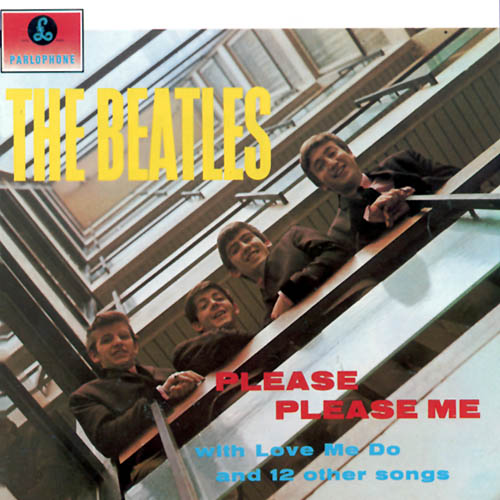
Please Please Me (1962)

1.I Saw Her Standing There
2.Misery
3.Anna
4.Chains
5.Boys
6.Ask Me Why
7.Please Please Me
8.Love Me Do
9.P.S. I Love You
10.Baby It's You
11.Do You Want To Know A Secret
12.A Taste of Honey
13.There's A Place
14.Twist and Shout
It is often difficult for younger listeners—those raised on decades of musical evolution—to grasp the seismic shift caused by the Beatles’ debut album. Like flicking on a light switch in a room already illuminated by a thousand watt flood, it hardly seems remarkable. But consider the context: in early 1963, rock & roll was floundering. The original pioneers were fading—Elvis in uniform, Buddy Holly buried, and Little Richard preaching. In their place, the industry served up a sanitized lineup of matinee idols with more hair product than harmonic range. Into this vacuum came four lads from Liverpool with instruments in hand, writing their own songs and singing them too. The shock was profound.
Please Please Me—recorded in a single, famously efficient one-day session—was not just a collection of songs; it was a statement of arrival. Nearly half of its fourteen tracks were penned by John Lennon and Paul McCartney, a practice virtually unheard of at the time. Most artists sang the words of others. The Beatles sang their own, and did so with youthful swagger and musical clarity. The result: an album that is both of its time and beyond it.
The opener, I Saw Her Standing There, sets the tone immediately—raucous, melodic, confident. While not originally a hit single, it has since earned its place in the pantheon of rock staples. At the other end of the album lies Twist and Shout, a cover yes, but one so thoroughly possessed by Lennon’s shredded vocal that it might as well have been written for him. Ironically, the song was a last-minute inclusion, added only after producer George Martin insisted they needed one more track to fill the record. Recorded in a single take, it remains one of the most electrifying closing numbers in pop history.
Martin’s role cannot be overstated. A veteran producer of classical and comedy records, he brought a technical precision and an ear for arrangement that elevated the group’s natural talents. While EMI’s budget was tight, Martin’s guidance helped the Beatles maximize every second of their session. His instincts proved crucial: when he heard the band’s early version of the single Please Please Me, he declared it their first number one. He was right.
Customarily, early Beatles albums offered vocal features for George Harrison and Ringo Starr. Harrison acquits himself well on Do You Want to Know a Secret?, though the song would later find more commercial success in Billy J. Kramer’s version. Ringo, meanwhile, delivers Boys—a high-energy romp borrowed from the Shirelles, carried with gusto if not subtlety. Elsewhere, the band tackles a range of covers from Arthur Alexander (Anna) to A Taste of Honey, the latter revealing McCartney’s early inclination toward more sentimental, almost cabaret-style fare. If these moments now seem quaint, they were anything but at the time. Even the softer songs were handled with sincerity, polish, and a group cohesion that was rare in any genre.
One must also consider the peculiarities of 1960s record distribution. A hit single often wasn’t included on an album—a strategy that now seems baffling. In the case of Please Please Me, British and American pressings often differed significantly, sometimes sharing a title while sporting wildly different track listings. Thankfully, modern reissues and compilations like Past Masters Vol. 1 and Past Masters Vol. 2 have helped reconcile these disjointed catalogues for contemporary listeners.
Ultimately, Please Please Me stands not simply as a debut, but as a blueprint. It distilled years of stage performance into 32 minutes of energetic, genre-defining pop music. For the Beatles, it was the first chapter in a musical revolution. For the rest of us, it still sounds like the moment the lights came on.